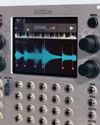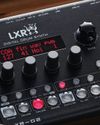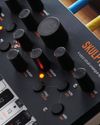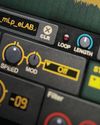
As soon as Korg’s variants on ARP’s venerable Odyssey were released, speculation began: when would the company trundle out a version of the mighty ARP 2600? That was five years ago, but now that dream is a reality and though Korg’s Odyssey is a lovely little thing, it in no way prepares one for the majesty of this modular monolith.
This is no cheap imitation. The original ARP 2600 came built into a Tolex-covered cabinet. So, too, does this. However, that – and its similarly-housed companion keyboard – are tucked into a rugged flight case. Be warned: it is extremely heavy. Happily, casters are included.
Once removed from its protective shell, this new ARP is revealed to be the spitting image of the original, having only the merest differences. There are minor changes to the hardware – sturdier handles, for example – adding to the impression that this is an improved edition, rather than a knock off. For the most part, it looks as if 50 years of technological advancement have all but been ignored, save for the presence of MIDI and USB connections on the left side of the case. Closer inspection reveals that the Cinch Jones connectors used to connect the original main unit to the 3620 keyboards have been replaced by 8-pin DIN jobs. Likewise, the power connector on the right side has been swapped out for a familiar IEC connector. A pair of XLR outputs are also included in addition to the 3.5mm outputs on the front panel.
The only 1/4” output is reserved for headphone use.
Korg tell us that, despite it being nearly identical on the outside, the reissue’s inner workings are made up of a combination of through-hole circuits along with modern surface mount technology.
The unit under review was a prototype version that featured the dark grey panel of the units released between 1971 and 1977. At the time of this writing, this is the only color-scheme planned, but that could change.
Diese Geschichte stammt aus der March 2020-Ausgabe von Future Music.
Starten Sie Ihre 7-tägige kostenlose Testversion von Magzter GOLD, um auf Tausende kuratierte Premium-Storys sowie über 8.000 Zeitschriften und Zeitungen zuzugreifen.
Bereits Abonnent ? Anmelden
Diese Geschichte stammt aus der March 2020-Ausgabe von Future Music.
Starten Sie Ihre 7-tägige kostenlose Testversion von Magzter GOLD, um auf Tausende kuratierte Premium-Storys sowie über 8.000 Zeitschriften und Zeitungen zuzugreifen.
Bereits Abonnent? Anmelden

SONIC DESTRUCTION
From overdriven signal paths to rhythmic malfunctions, there’s plenty of creativity to be found by doing things just a little bit wrong

Feed Me
EDM producer Jon Gooch revives his cartoonish Feed Me moniker. Danny Turner finds out how the use of live instrumentation changed his production approach

Exploring Akai MPC
Leo Maymind takes a detailed look at an iconic groovebox whose influence helped shape modern hip-hop and much more besides

Liars
Dissolving the contours of rock and electronics, Danny Turner charts the making of Liars’ 10th album with Angus Andrew and Laurence Pike

Jean-Michel Jarre
The pioneering musician who introduced generations to futuristic sounds the first time around is at it again. He joins Matt Mullen to talk experiments in VR gigging, spatial audio and more...

Noise
With roots as far back as 1913, noise is the genre that’s also a state of mind

1010 Music Bitbox mk2 £549
Rob Redman finds out whether this updated sampler box of tricks contains any more surprises

Erica Synths and Sonic Potions LXR-02 £499
Rob Redman braces himself for another resurrected blast from the past

Modal SKULPTsynth SE £169
Modal are back with an update to their SKULPT synth. Bruce Aisher takes a listen to see if it can rustle up a big sound

Reason Studios Reason 12 £399
Now in both DAW and plugin realms, Reason gains a sampler and refreshed Combinator. Si Truss investigates